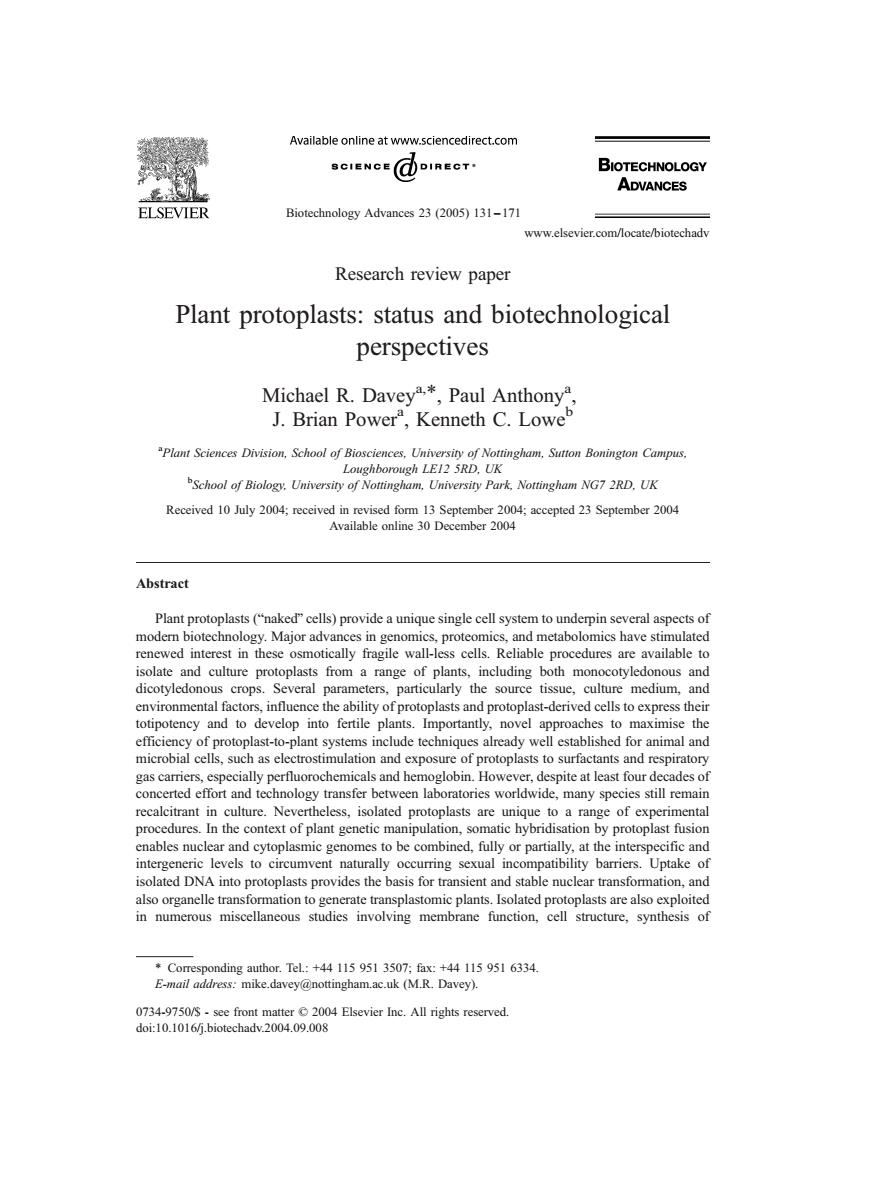正在加载图片...

Available online at www.sciencedirect.com BIOTECHNOLOGY ADVANCES ELSEVIER Biotechnology Advances 23(2005)131-171 www.elsevier.com/locate/biotechadv Research review paper Plant protoplasts:status and biotechnological perspectives Michael R.Daveya.*,Paul Anthony", J.Brian PowerKenneth C.Lowe Plant Sciences Division,School of Biosciences,University of Nottingham.Sutton Bonington Campus. Loughborough LE12 5RD.UK School of Biology.University of Nottingham.University Park.Nottingham NG7 2RD.UK Received 10 July 2004;received in revised form 13 September 2004;accepted 23 September 2004 Available online 30 December 2004 Abstract Plant protoplasts("naked"cells)provide a unique single cell system to underpin several aspects of modern biotechnology.Major advances in genomics,proteomics,and metabolomics have stimulated renewed interest in these osmotically fragile wall-less cells.Reliable procedures are available to isolate and culture protoplasts from a range of plants,including both monocotyledonous and dicotyledonous crops.Several parameters,particularly the source tissue,culture medium,and environmental factors,influence the ability of protoplasts and protoplast-derived cells to express their totipotency and to develop into fertile plants.Importantly,novel approaches to maximise the efficiency of protoplast-to-plant systems include techniques already well established for animal and microbial cells,such as electrostimulation and exposure of protoplasts to surfactants and respiratory gas carriers,especially perfluorochemicals and hemoglobin.However,despite at least four decades of concerted effort and technology transfer between laboratories worldwide,many species still remain recalcitrant in culture.Nevertheless,isolated protoplasts are unique to a range of experimental procedures.In the context of plant genetic manipulation,somatic hybridisation by protoplast fusion enables nuclear and cytoplasmic genomes to be combined,fully or partially,at the interspecific and intergeneric levels to circumvent naturally occurring sexual incompatibility barriers.Uptake of isolated DNA into protoplasts provides the basis for transient and stable nuclear transformation,and also organelle transformation to generate transplastomic plants.Isolated protoplasts are also exploited in numerous miscellaneous studies involving membrane function,cell structure,synthesis of Corresponding author.Tel:+44 115 951 3507:fax:+44 115 951 6334. E-mail address:mike.davey@nottingham.ac.uk (M.R.Davey). 0734-9750/S-see front matter 2004 Elsevier Inc.All rights reserved doi:10.1016f.biotechadv.2004.09.008Research review paper Plant protoplasts: status and biotechnological perspectives Michael R. Daveya,*, Paul Anthonya , J. Brian Powera , Kenneth C. Loweb a Plant Sciences Division, School of Biosciences, University of Nottingham, Sutton Bonington Campus, Loughborough LE12 5RD, UK b School of Biology, University of Nottingham, University Park, Nottingham NG7 2RD, UK Received 10 July 2004; received in revised form 13 September 2004; accepted 23 September 2004 Available online 30 December 2004 Abstract Plant protoplasts (bnakedQ cells) provide a unique single cell system to underpin several aspects of modern biotechnology. Major advances in genomics, proteomics, and metabolomics have stimulated renewed interest in these osmotically fragile wall-less cells. Reliable procedures are available to isolate and culture protoplasts from a range of plants, including both monocotyledonous and dicotyledonous crops. Several parameters, particularly the source tissue, culture medium, and environmental factors, influence the ability of protoplasts and protoplast-derived cells to express their totipotency and to develop into fertile plants. Importantly, novel approaches to maximise the efficiency of protoplast-to-plant systems include techniques already well established for animal and microbial cells, such as electrostimulation and exposure of protoplasts to surfactants and respiratory gas carriers, especially perfluorochemicals and hemoglobin. However, despite at least four decades of concerted effort and technology transfer between laboratories worldwide, many species still remain recalcitrant in culture. Nevertheless, isolated protoplasts are unique to a range of experimental procedures. In the context of plant genetic manipulation, somatic hybridisation by protoplast fusion enables nuclear and cytoplasmic genomes to be combined, fully or partially, at the interspecific and intergeneric levels to circumvent naturally occurring sexual incompatibility barriers. Uptake of isolated DNA into protoplasts provides the basis for transient and stable nuclear transformation, and also organelle transformation to generate transplastomic plants. Isolated protoplasts are also exploited in numerous miscellaneous studies involving membrane function, cell structure, synthesis of 0734-9750/$ - see front matter D 2004 Elsevier Inc. All rights reserved. doi:10.1016/j.biotechadv.2004.09.008 * Corresponding author. Tel.: +44 115 951 3507; fax: +44 115 951 6334. E-mail address: mike.davey@nottingham.ac.uk (M.R. Davey). Biotechnology Advances 23 (2005) 131 – 171 www.elsevier.com/locate/biotechadv